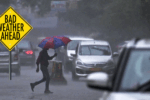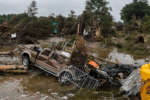New Yorkers can look forward to a mostly sunny week ahead, bringing some relief after recent cloudy and rainy days. The weather is expected to be bright and clear, perfect for outdoor activities and exploring the city. However, residents in the coastal boroughs should stay alert as coastal flood advisories remain in effect due to high tides and strong winds.
The National Weather Service has issued these advisories for parts of Brooklyn, Queens, Staten Island, and the Bronx. Coastal flooding can lead to temporary road closures and water pooling in low-lying areas. So, while you enjoy the sunny skies, it’s important to stay informed and take any necessary precautions if you live near the shoreline.
What to Expect in the Coming Days
Temperatures in New York City’s five boroughs are expected to rise gradually, with highs reaching the mid-70s Fahrenheit by midweek. This comfortable temperature range is ideal for spending time outdoors, whether you want to visit parks, stroll along the waterfront, or enjoy an open-air café. The sunny weather will reduce humidity levels, making the city more pleasant overall.
According to the National Weather Service New York office, the main weather concerns remain around the coastal zones. The advisories stem from forecasted tidal surges combined with sustained wind gusts that can push water onto local streets. This is especially true during high tide periods occurring late in the week.
Understanding Coastal Flood Advisories
Coastal flood advisories inform the public about the risk of minor flooding in low-lying coastal areas. Unlike warnings which indicate significant flooding, advisories mean some streets and properties may experience temporary flooding. It is usually not dangerous but can cause inconvenience and property damage if residents are not prepared.
The areas most affected in New York are near the East River, Jamaica Bay, and parts of the Hudson River’s lower east side. The advisory suggests that water levels could rise to the point where walking or driving becomes difficult in some spots. The city is working closely with emergency services to update residents and keep everyone safe.
Tips for Staying Safe During Coastal Flooding
While sunny weather invites people outdoors, it’s important to remain cautious if you live or travel near coastal flood zones. Here are some key safety tips to follow:
- Check local news and weather updates regularly.
- Avoid walking or driving through flooded streets.
- Move valuables and electronics to higher ground if you live in vulnerable areas.
- Be prepared for sudden changes in weather and follow any instructions from local authorities.
The city’s alert system and weather apps are useful tools for staying informed. New Yorkers can also follow updates directly from NYC Emergency Management to know if conditions change.
Best Outdoor Spots to Visit in the Sunny Weather
With clear skies and pleasant temperatures, it’s a great time to enjoy some of New York’s world-famous outdoor locations. Central Park remains one of the best places to soak in the sunshine and enjoy nature within the city. The High Line, a linear park built on an elevated rail line, offers fantastic views and a relaxing stroll.
For those near the water but wanting to avoid flood-prone areas, Brooklyn Bridge Park provides safe waterfront access with picnic areas, biking paths, and stunning skyline views. Visiting early in the day is recommended to avoid any high tide flooding closer to the shore.
Looking Ahead: Weather Trends for the Weekend
By the weekend, the weather is expected to stay mostly sunny but with slightly cooler temperatures in the low 70s with increased wind speeds near the coast. This may continue to contribute to minor coastal flooding episodes, so residents should keep monitoring advisories.
The overall outlook remains positive for those planning to enjoy the city’s outdoor events or just want to walk around exploring different boroughs. Staying aware of the coastal flood advisories will ensure everyone can safely make the most of the sunny weather.
For the latest updates and detailed forecasts, visit the Weather Channel New York page or check the National Weather Service frequently throughout the week.







